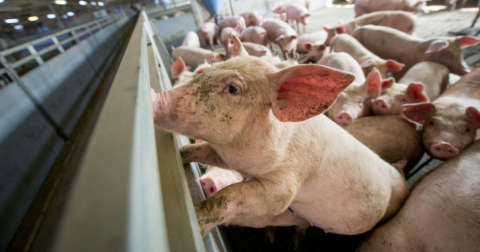News
A Major Agreement to Protect the Amazon Is Falling Apart After 20 Years
Climate•6 min read
Explainer
The year ahead brings new legal challenges for animals and the advocates working to protect them.


Words by Marlena Williams
Twenty twenty-three was a landmark year — the first time the Supreme Court sided with animal welfare in its decision to uphold Proposition 12. But the future legal status of animals in the U.S. is anything but settled. Lawmakers across the country kicked off 2024 with a flurry of legislation that could impact animals, the food system and the environment for years to come. From bills targeting so-called lab-grown meat to never-ending efforts to overturn Proposition 12, here are some of the most important pending state actions and laws for animals to follow in 2024.
Though plant-based proteins saw a dip in sales last year, don’t count the industry out just yet. 2024 promises to be a big year for the alternative protein market. Expect to see new options marketed as minimally processed (like mushroom-based steaks), more government support for alternative protein companies and major meat industry players like Tyson entering the game with their own plant-based products.
But the political pushback to alternative proteins is holding steady too, as a number of states attempt to ban or curtail cultivated meats and other animal-free alternatives, especially the way these foods will be labeled and marketed. Florida and Texas are already trying to restrict alternative proteins within their borders, and more states are slated to join them in 2024.
In early January, lawmakers in Missouri introduced a bill that would amend the state’s food labeling laws to prohibit the manufacture and sale of alternative proteins unless expressly labeled as “lab-created,” “insect-based” or with some other qualifier. Any person who violates these requirements could face a fine of $1,000 dollars per product and/or a prison term of less than one year.
Georgia, Oklahoma and Arizona introduced similar laws that impose strict labeling requirements on alternative proteins, as well as disclosure requirements on restaurants and other food service establishments who might serve them.
Wisconsin lawmakers are trying to place similar restrictions on the sale of alternative milks, banning companies from using the word “milk” on any product unless it comes from cows or other “hooved or camelid animals.” This bill comes with a unique hitch: the provisions wouldn’t go into effect until at least 10 other listed states enact similar legislation.
Proposition 12 — the landmark California law prohibiting the sale of certain products sourced from animals held in extreme confinement — is now fully in effect in the state, with similar laws passed in Massachusetts and New Jersey. Now that the ruling in National Pork Producers Council v. Ross appears to give this kind of legislation the green light, a number of other states are passing stronger welfare protections for farmed animals.
A new Maryland bill introduced earlier this month would prohibit the use of battery cages for egg-laying hens, and prohibit the sale of any egg or egg products sourced from hens confined in battery cages.
Also in January, Oklahoma lawmakers introduced a bill creating the Oklahoma Rural Investment for Sow Farms Program, which would help pork producers transition from the use of gestation crates to group housing for female pigs. In addition, the program would provide funds for farmers to renovate group housing pens and to train producers, managers and workers on Humane Farm Animal Care. To receive the funding, a producer must commit to permanently phasing out the use of gestation crates at their facilities.
But the political opposition to this kind of legislation remains strong. At the federal level, lawmakers are attempting to prevent states from instituting animal welfare legislation through proposed laws like the EATS Act and the Protecting Interstate Commerce for Livestock Producers Act, which some animal advocates worry could be passed as part of the Farm Bill.
Still other states are attempting to prevent animal welfare legislation from moving forward in towns and cities within their borders. A proposed Wisconsin law would prohibit localities from regulating agriculture operations in areas zoned exclusively or primarily for agricultural use, unless there is some substantial threat to public health and safety.
In 2023, Oregon banned the retail sale of commercially bred dogs and cats, joining six other states, including California and Maryland, and hundreds of other cities and counties, like Philadelphia, Boston and Chicago. New York state also passed legislation last year aiming to end the puppy mill-to-pet store pipeline and stop abusive breeders from operating in the state. Other states are attempting to follow suit in 2024.
On January 11, lawmakers in Indiana proposed a bill that would require dog breeders and retail pet stores to undergo random, unannounced inspections at their facilities. In addition, the law would impose registration, recordkeeping and other requirements on pet stores, animal rescues and other animal care operations. But the bill also includes a provision to prevent the enforcement of any local ordinances that prohibit the retail sale of dogs and cats altogether.
Kentucky Senate Bill 41 would ban pet stores from selling dogs and cats. It would also prohibit the sale or showcasing of companion animals in public spaces, though shelters and rescues would still be allowed to bring dogs and cats to pet stores for adoption purposes.
A proposed Missouri law would prohibit dealers and pet stores from buying animals from unlicensed entities or sellers with multiple violations of state or federal law. In addition, it would require pet shops to disclose the names and addresses of breeders and dealers to purchasers. But like the Indiana bill, it would also preempt any localities from enacting laws that prohibit the retail sale of pets in the future.
On January 2nd, lawmakers in Kentucky introduced a bill that would make it a crime to film, record or photograph inside a concentrated animal feeding operation (CAFO) or food manufacturing or processing facility in the state. Ag-Gag laws like this criminalize the essential work of whistle-blowers and undercover activists and severely limit their ability to expose the horrendous conditions at factory farms, slaughterhouses and other animal facilities. Though courts routinely strike down such laws as unconstitutional, ag-gag laws remain on the books in Alabama, Arkansas, Iowa, Missouri, Montana and North Dakota.
This isn’t the first time Kentucky has tried to pass ag-gag legislation. In 2014, Kentucky lawmakers unsuccessfully attempted to sneak an ag-gag law into a bill setting euthanasia standards for animal shelters.
A proposed Vermont bill would prohibit cosmetic testing on animals in the state unless certain narrow requirements are met. Though the bill is a step forward, it falls short of banning cosmetics testing outright, a practice that has been prohibited in at least eleven other states, including California, Illinois, Louisiana, New York, Virginia, and most recently, Oregon.
In Florida, a proposed law would require research facilities to make certain dogs and cats available for adoption after they are deemed no longer useful for experiments. It would also require animal testing facilities to compile and submit annual reports, which would document the number of animals used in experiments.
Though animals are generally considered property under the law, for years, groups like the Nonhuman Rights Project have been applying novel legal strategies to establish legal personhood for animals. In Utah, lawmakers are working to prevent these types of legal arguments from being used in court and elsewhere. A proposed Utah law would prohibit any governmental entity from recognizing legal personhood in a non-human animal. The bill is likely a response to a high-profile animal rights case that happened in the state in 2022, in which activists with Direct Action Everywhere were acquitted after removing two sick piglets from a Smithfield factory farm. These animal rights advocates say they hope to use cases like these to challenge animals’ legal status as property.
On January 8th, lawmakers in Washington state introduced legislation that would prohibit fur farming in the state and establish a grant program to help fur farmers transition out of the industry. Though demand for fur has been declining for years, there is currently no federal ban on fur operations, and though California has mostly banned the sale of fur products, no other state in the country currently bans fur farming outright. New York tried, and failed, to ban fur in 2019.
Service animals are currently not allowed in most prisons across the country, a policy that deprives incarcerated individuals with disabilities of an essential form of assistance. Though many prisons have highly successful programs where inmates help to raise and train future service animals, most incarcerated individuals in need are not allowed to have a service animal of their own. This year, a proposed New Jersey law could change that. Under the proposed law, the Department of Corrections would be required to establish a program allowing incarcerated individuals with physical, mental or developmental disabilities to receive assistance from service animals. Individuals could either bring their service animal with them to prison or petition the DOC to provide them with one.
More state legislatures will weigh in on animals in the year ahead. Some legal efforts seek to protect animals while others are hoping to block landmark reforms — but all of these suggest 2024 is almost certain to bring major changes to the way animals are treated under the law.